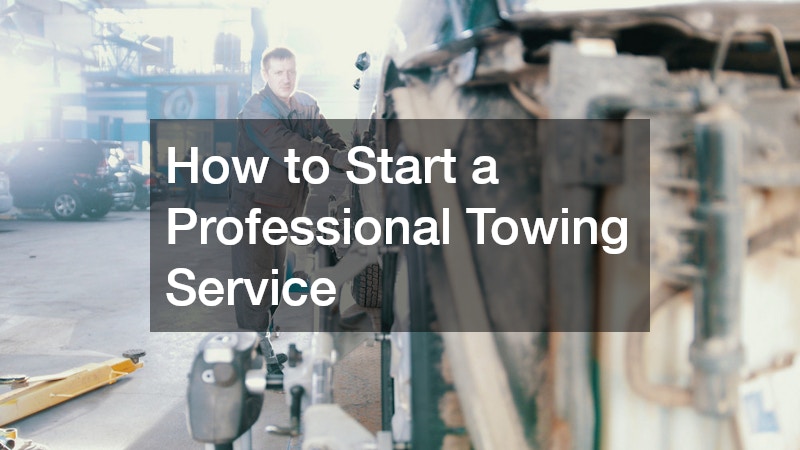Starting a professional towing service involves more than just owning a tow truck. This business requires strategic planning, adherence to legal requirements, and effective marketing strategies. This article aims to guide you through the essential steps and considerations for launching a successful towing service.
What are the essential tools and equipment needed?
Choosing the Right Tow Trucks
Choosing the right tow truck is pivotal to the success of your towing service. Different types of tow trucks, such as flatbed, wheel-lift, and hook-and-chain, each have specific advantages depending on the nature of the services you plan to offer.
For example, flatbed tow trucks are ideal for transporting vehicles without causing damage, making them suitable for high-end cars. On the other hand, wheel-lift tow trucks are more cost-effective and versatile, often used for moving disabled vehicles in tighter spaces.
Assess your service range and customer needs before investing in any tow truck models. It’s crucial to balance your budgetary constraints with the operational requirements of your intended business niche.
Additional Equipment and Tools
In addition to the right tow trucks, a professional towing service requires several essential tools and equipment. Hitches, chains, and straps are crucial for securing vehicles during transportation and ensuring safety.
Safety equipment like road cones, reflective vests, and warning lights will help protect both your operators and other road users. Investing in GPS systems can also enhance operational efficiency by providing accurate location and navigation details.
Regular maintenance of tools and equipment is equally important to avoid operational downtime. Keeping an inventory checklist can help you track the condition and availability of equipment, ensuring readiness for any towing assignment.
What legal requirements and licenses do I need?
Understanding Towing Regulations
Federal and state regulations govern the towing industry to ensure safety and compliance. Understanding these regulations is crucial for legal operation and avoiding hefty fines or other legal consequences.
Each state has its own specific set of rules regarding the towing and recovery of vehicles, often including weight restrictions and operational hours. Familiarizing yourself with these regulations can help you structure your business practices accordingly.
Regularly reviewing updates or changes in towing laws can also keep your business compliant. Consider consulting with a legal expert specializing in transportation law to ensure a thorough understanding and adherence to all applicable regulations.
Acquiring Necessary Licenses and Permits
Acquiring the correct licenses and permits is essential for starting a towing business legally. Start by obtaining a general business license at both the local and state levels.
In addition, you may require special towing permits specific to the type of services you provide. It’s also important to secure adequate insurance coverage to protect your business, employees, and customers in the event of an accident.
Preparation of the necessary documentation for these processes can streamline license acquisition. Contact local authorities or a business attorney to assist with obtaining and understanding the required paperwork for compliance.
How to create an effective business plan?
Setting Clear Goals and Objectives
An effective business plan begins with clear goals and objectives. Define your target market and service area to tailor your offerings accordingly.
Understanding customer demographics and needs can help you focus your services, whether it’s roadside assistance, long-distance towing, or emergency recovery. Outlining your business goals provides both direction and measurement metrics for success.
Establishing a timeline for achieving these goals can help maintain your business’s growth and keep you accountable. Re-evaluate your objectives periodically to ensure they align with industry changes and customer demand.
Financial Planning and Budgeting
Financial planning is critical to the feasibility and sustainability of your towing service. Begin by calculating startup costs, including tow trucks, tools, licenses, and advertising expenses.
Understanding your operational expenses, such as fuel, maintenance, and wages, will help you plan your budget effectively. Develop detailed financial forecasts to anticipate revenue expectations and potential profit margins.
Creating financial reserves can provide a safety net for unforeseen expenses or lean operational periods. Regular financial reviews can assist with budget adjustments and ensure financial health for your towing service.
How to market a towing service effectively?
Building a Brand Identity
Establishing a strong brand identity is crucial in differentiating your towing service from competitors. This involves creating a professional brand, including designing compelling logos and choosing cohesive colors that reflect your company values.
Your brand should convey reliability, safety, and professionalism to potential clients. Establishing a unique selling proposition (USP) can communicate what makes your service distinctive in the market.
Using Online and Offline Marketing Techniques
Effective marketing combines both online and offline strategies to maximize reach. For digital marketing, leverage SEO practices to improve your website’s visibility on search engines and attract more traffic.
Local advertising in newspapers and on community boards can also boost your towing service’s profile. Participate in partnerships with local businesses, such as repair shops or insurance agents, to promote cross-referrals.
How to ensure service quality and customer satisfaction?
Training and Hiring Skilled Operators
Hiring skilled operators is vital to delivering quality towing services. Emphasize practices that focus on technical skills and safety awareness during the hiring process.
Offering comprehensive training programs ensures your team is prepared to handle various towing situations efficiently and safely. Invest in continuous education opportunities to keep your staff updated on industry best practices and new equipment.
Implementing Customer Service Protocols
Outstanding customer service is critical to the success and reputation of your towing service. Develop clear customer service protocols that guide interactions with clients towards efficiency and courtesy.
Encouraging feedback from clients can help identify areas for improvement and acknowledge outstanding service. Prompt resolution of complaints can transform a negative experience into a positive one, retaining customer loyalty.




